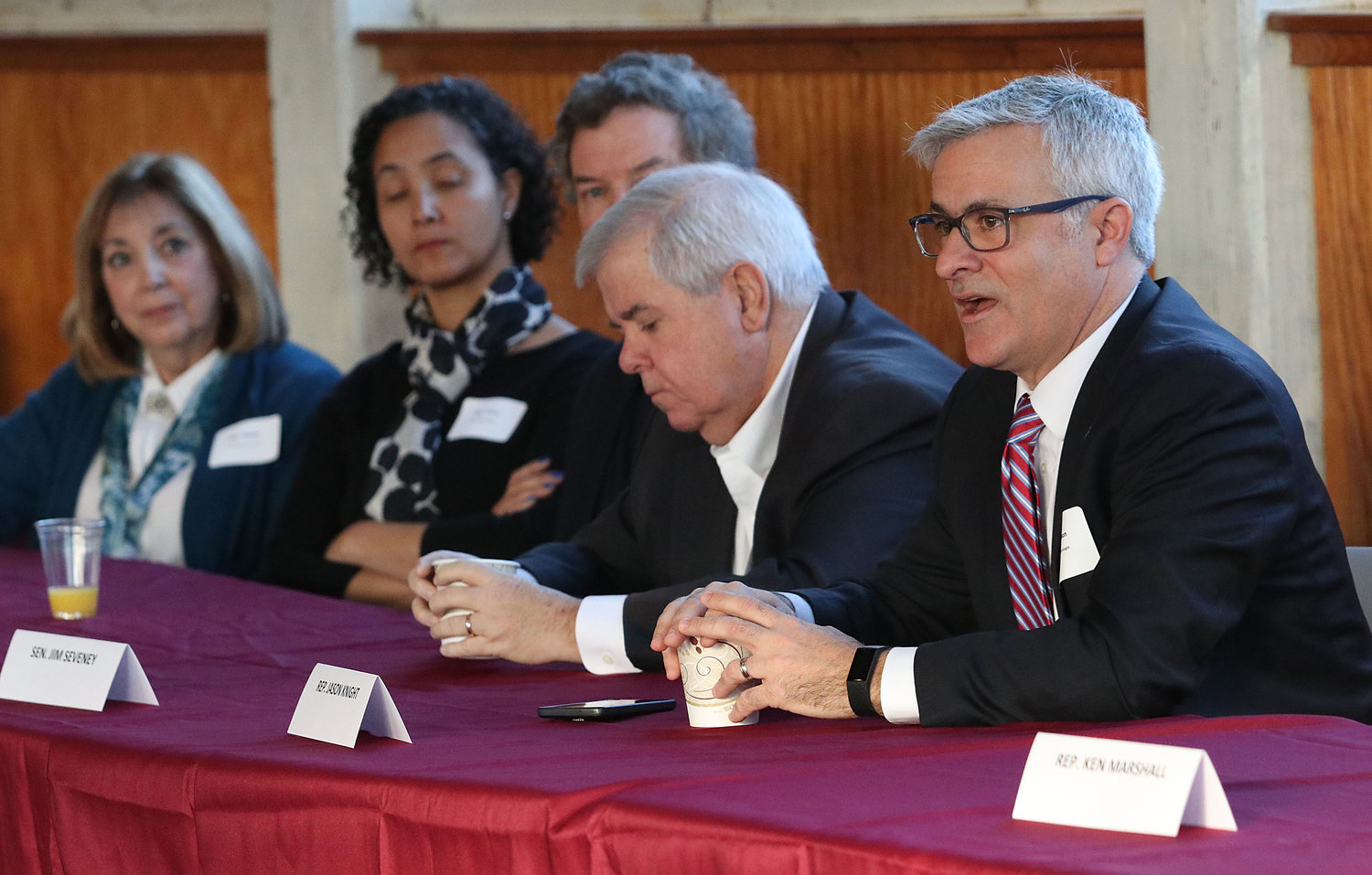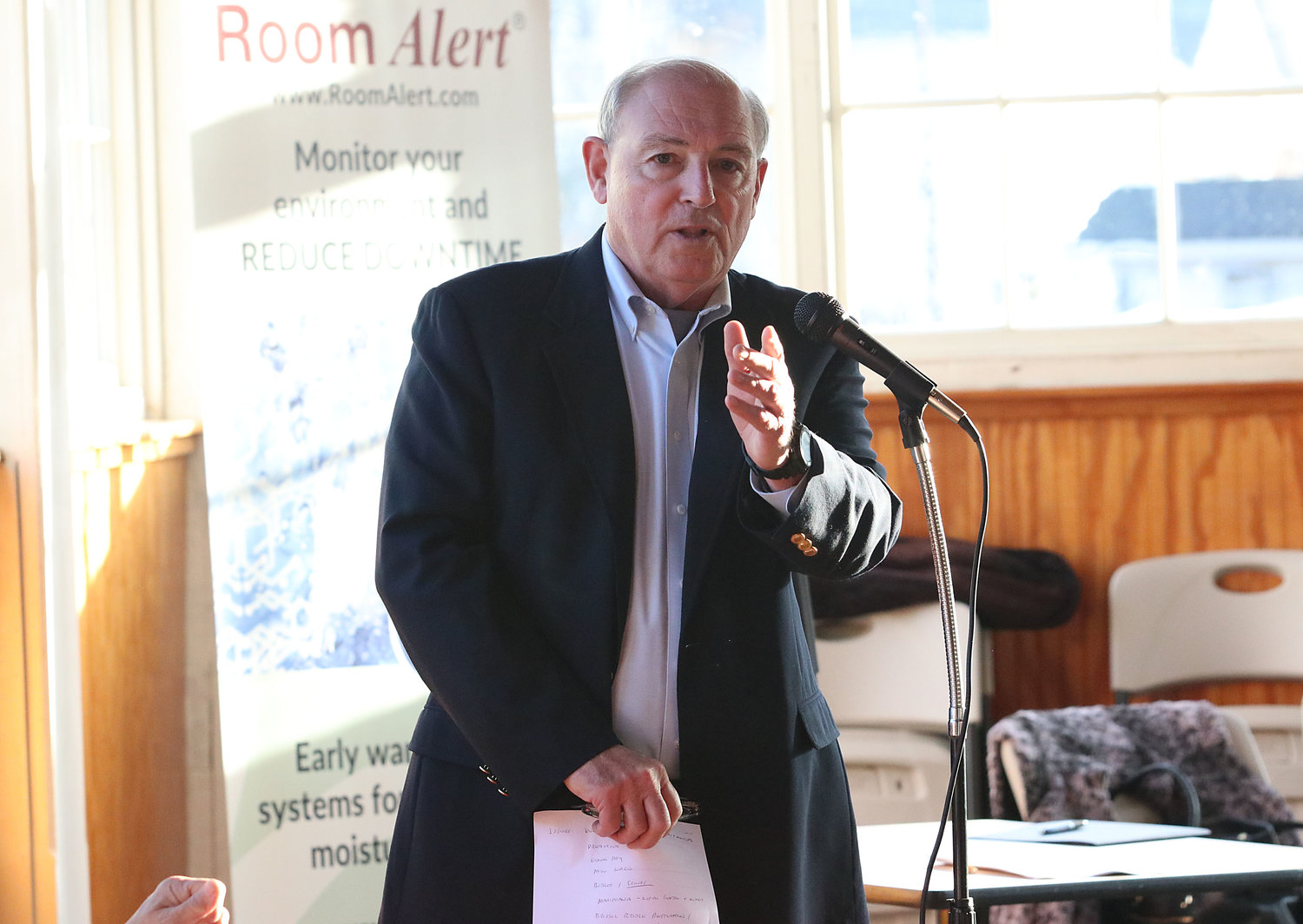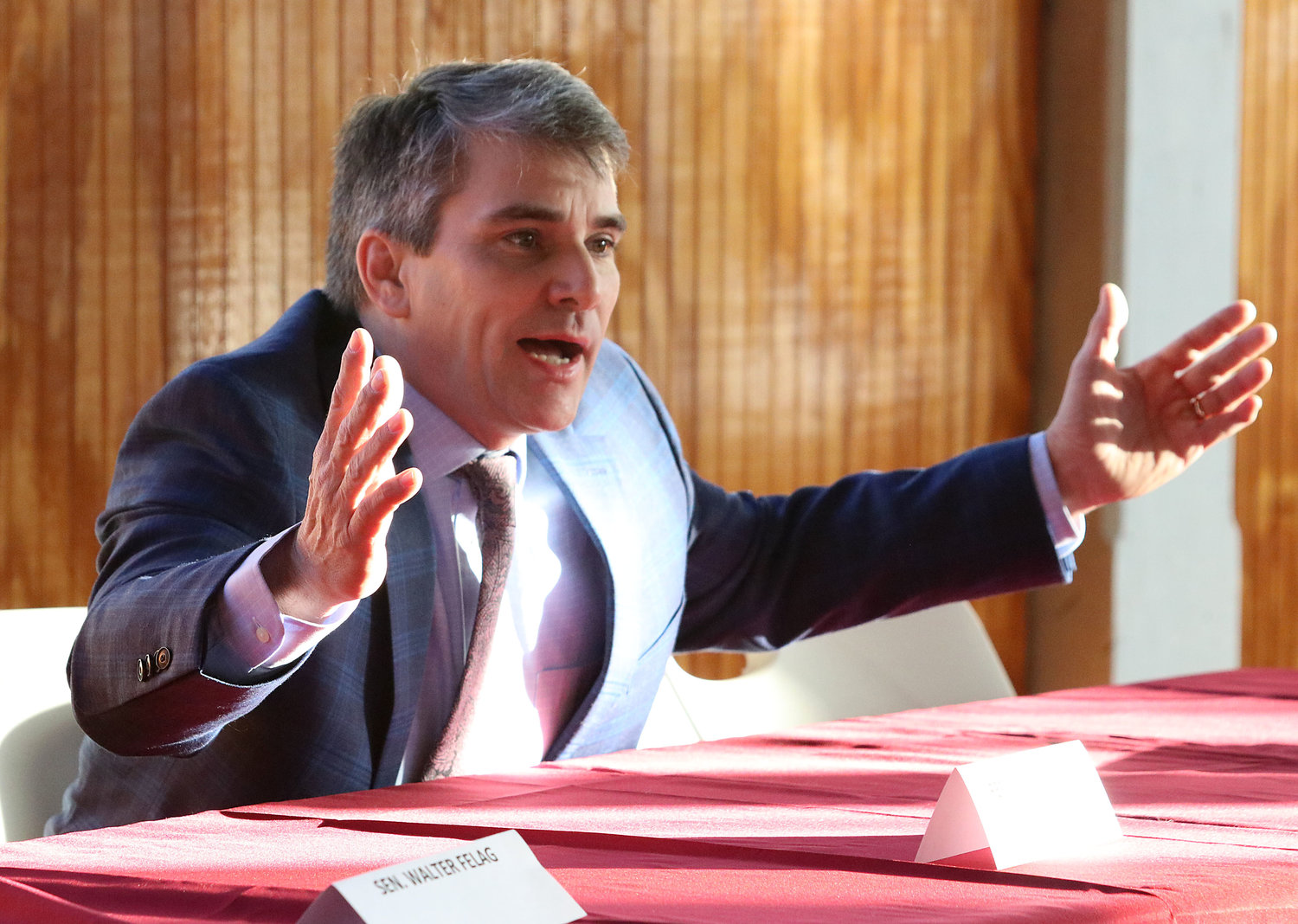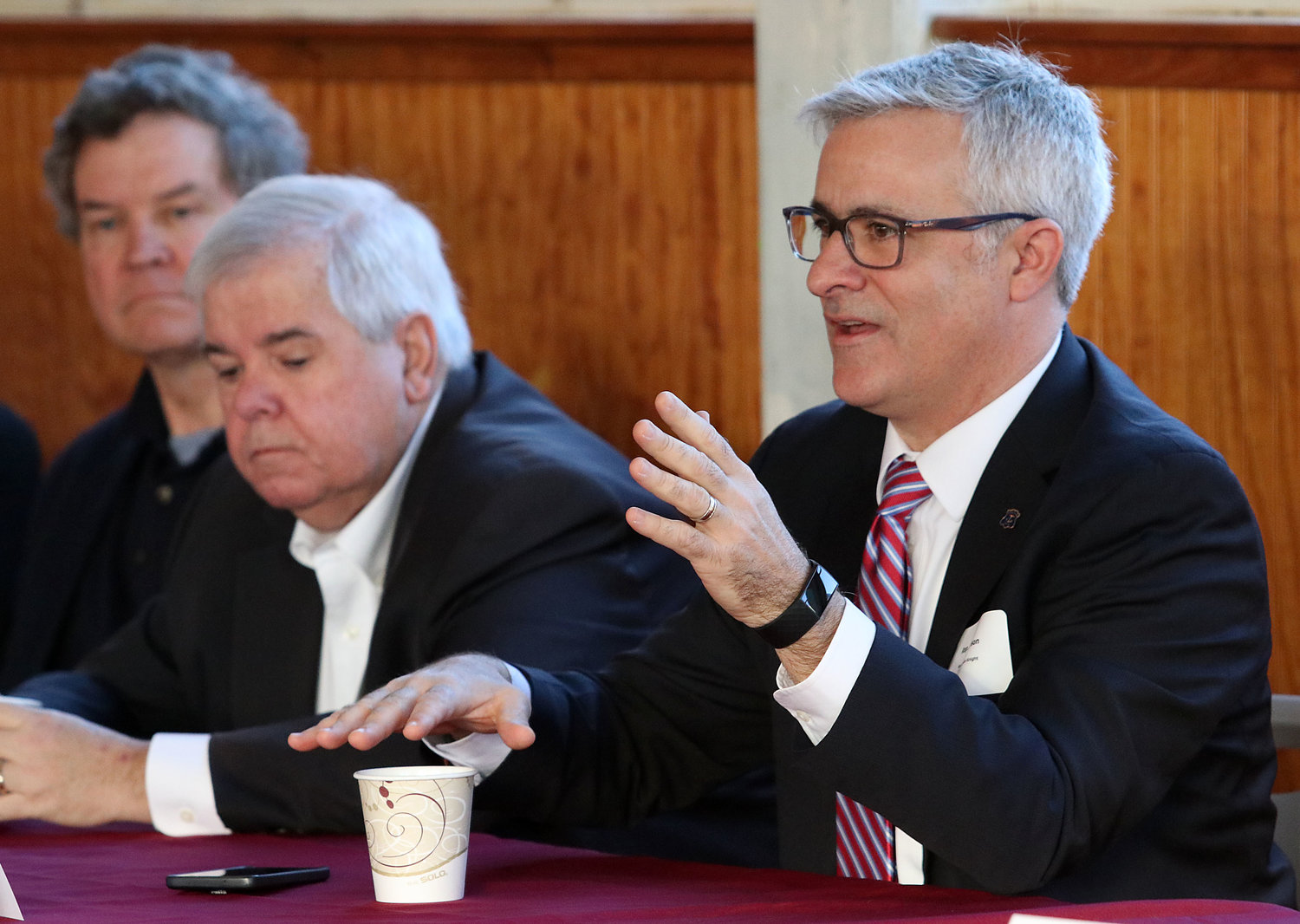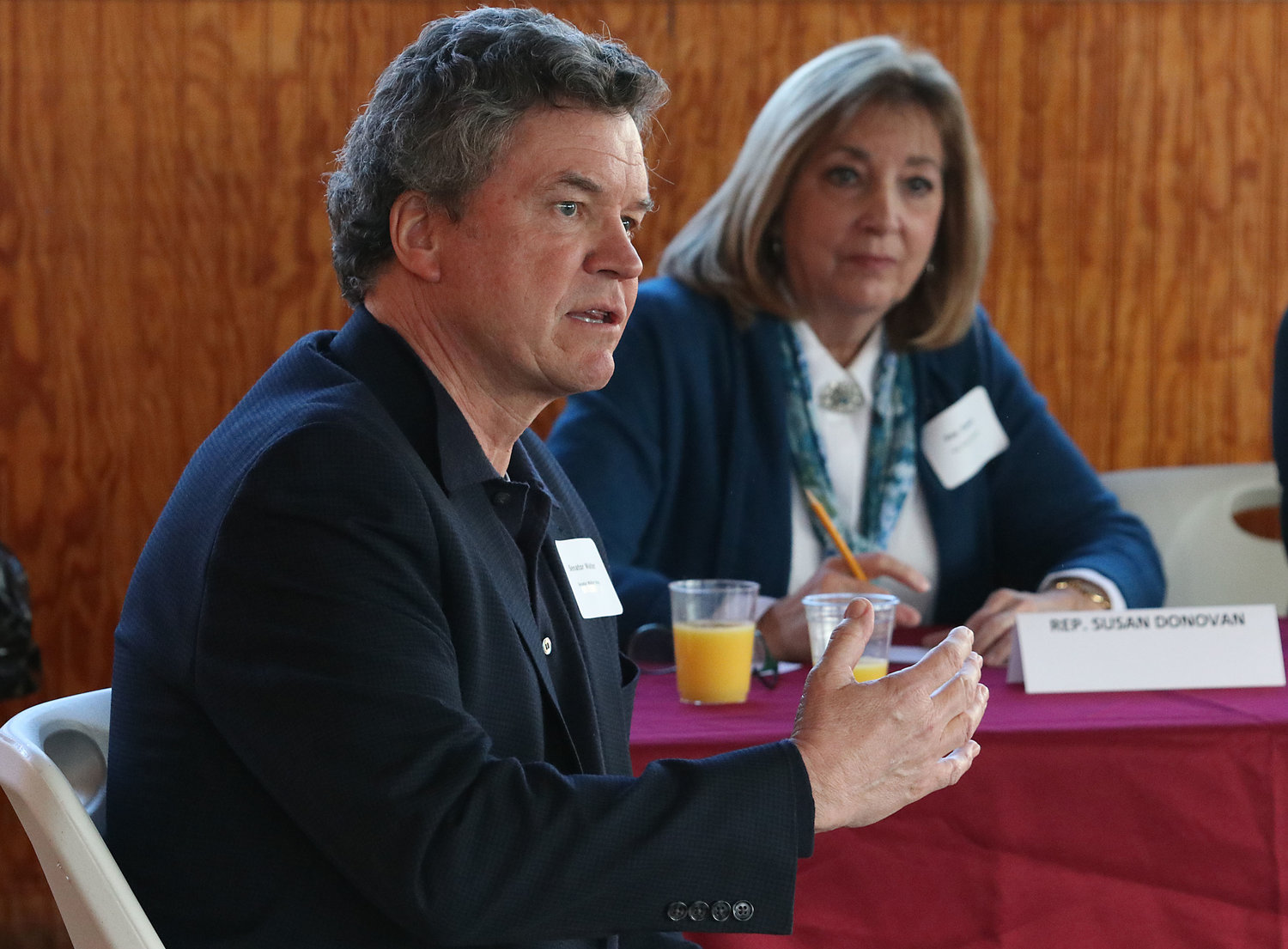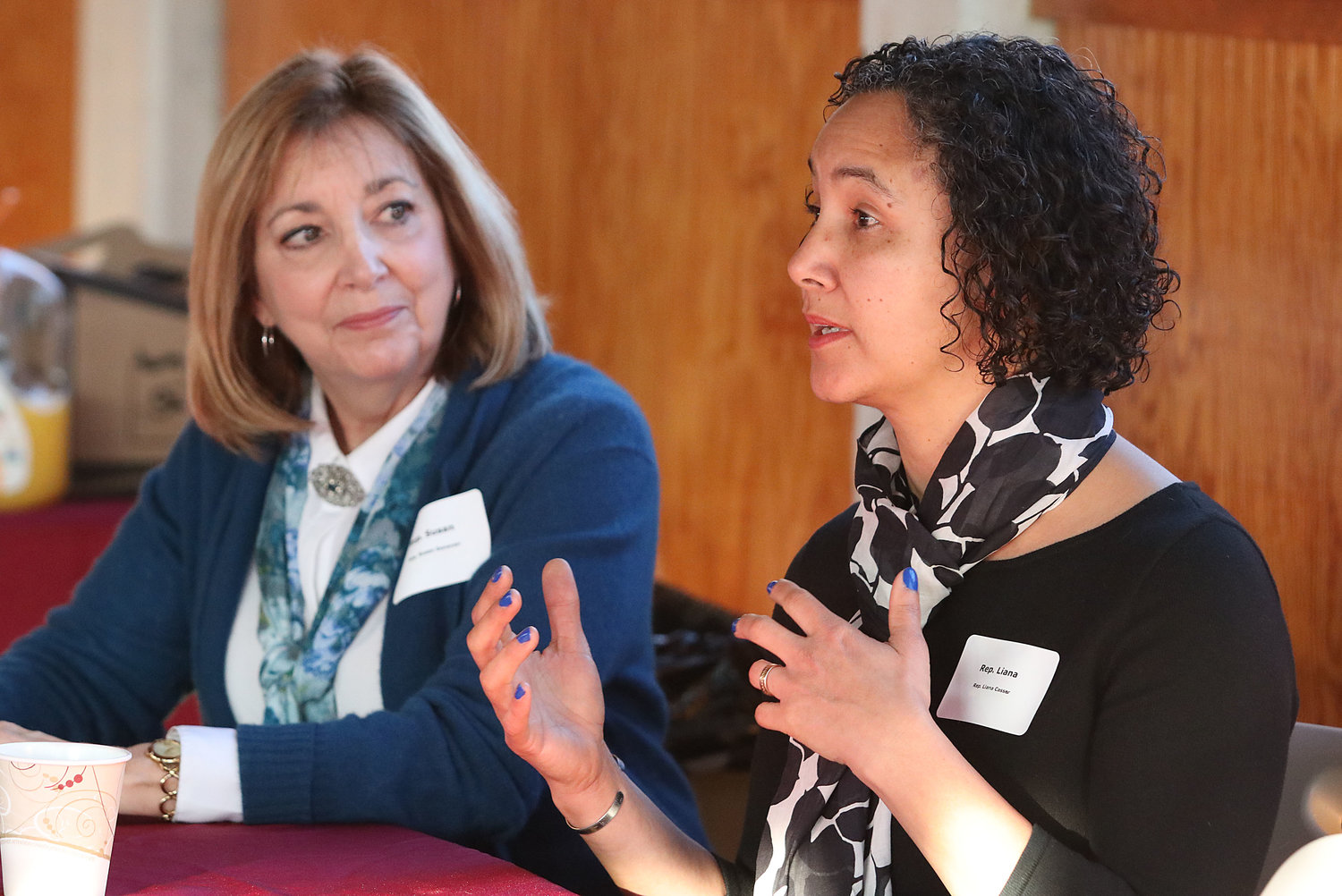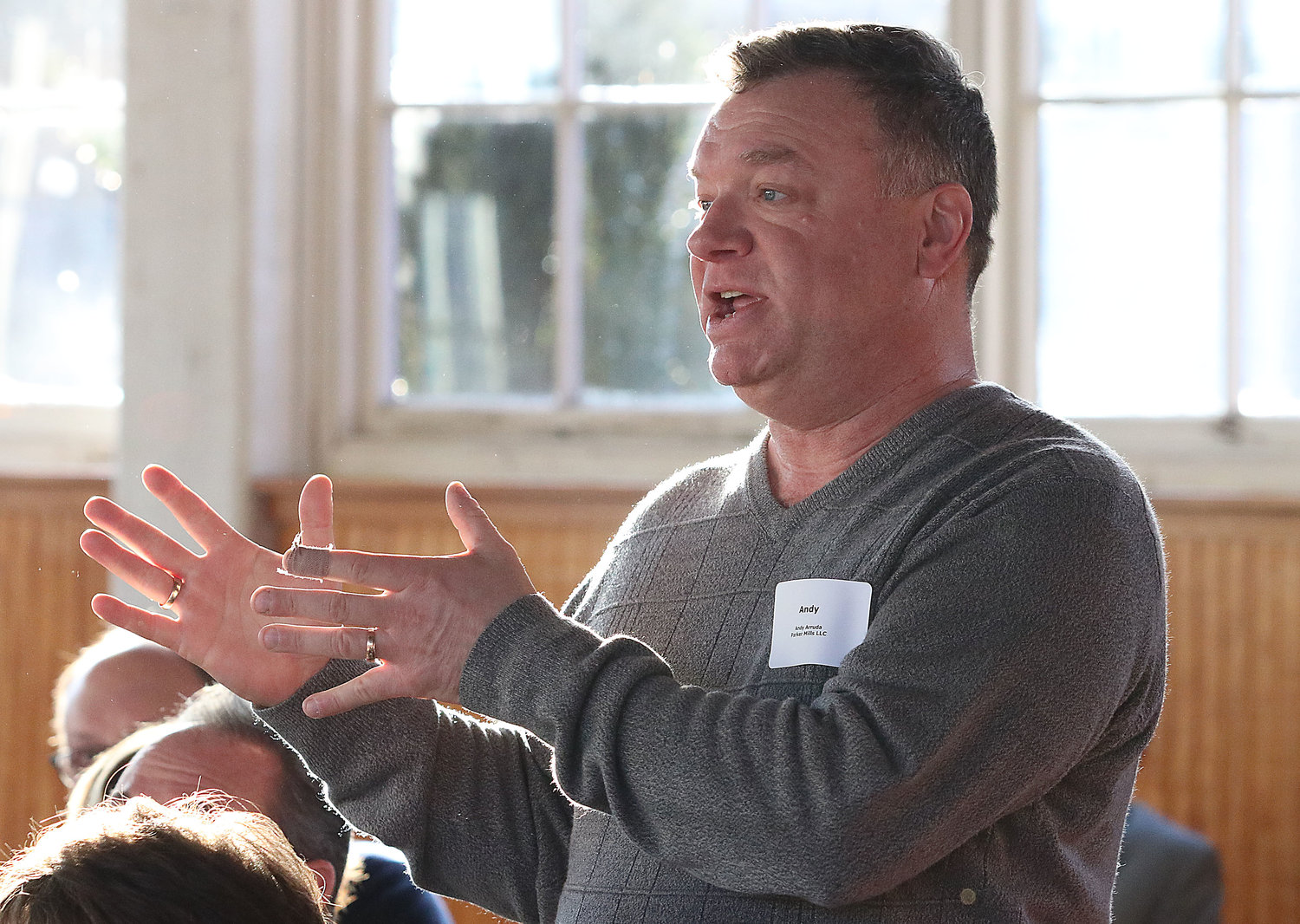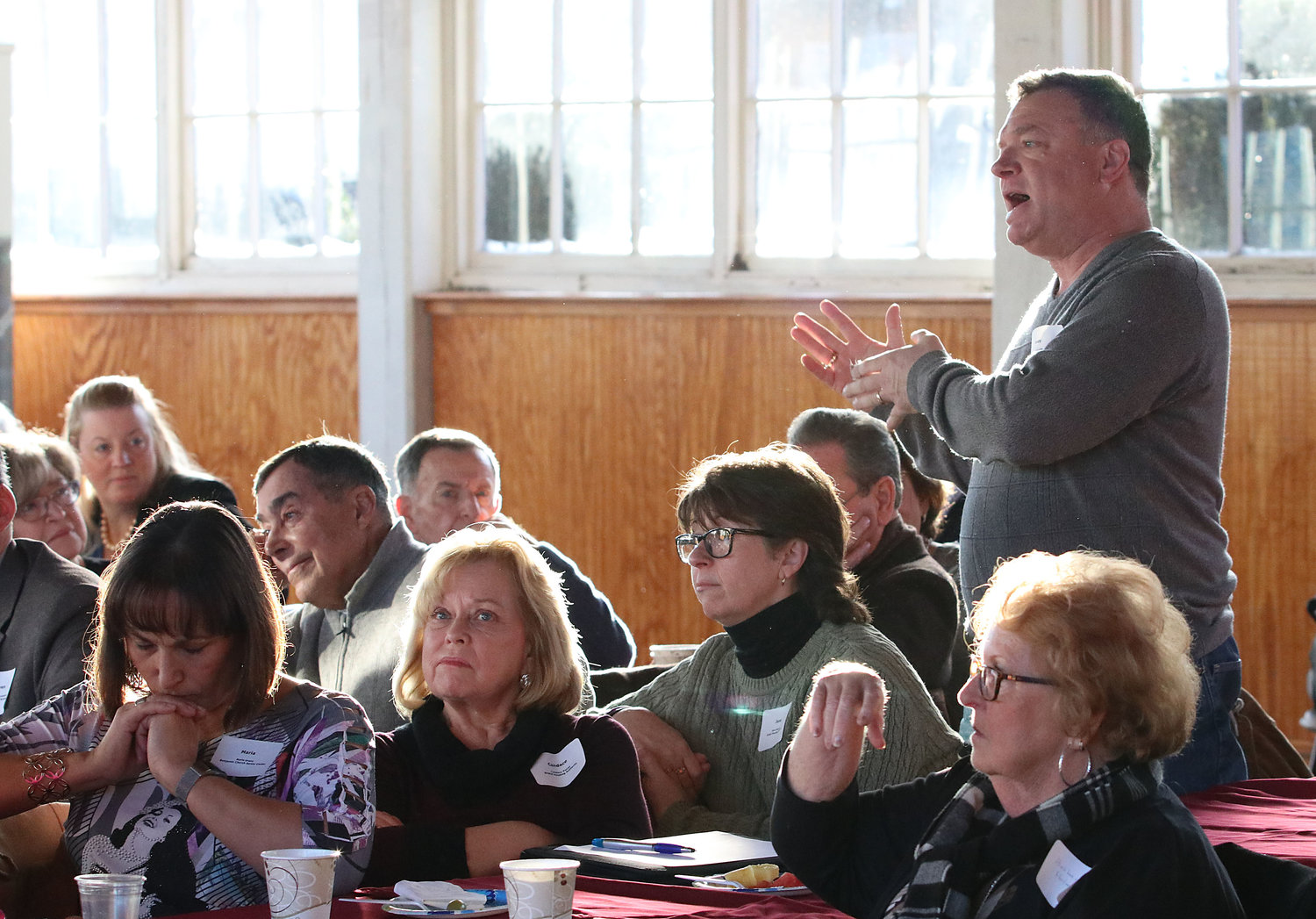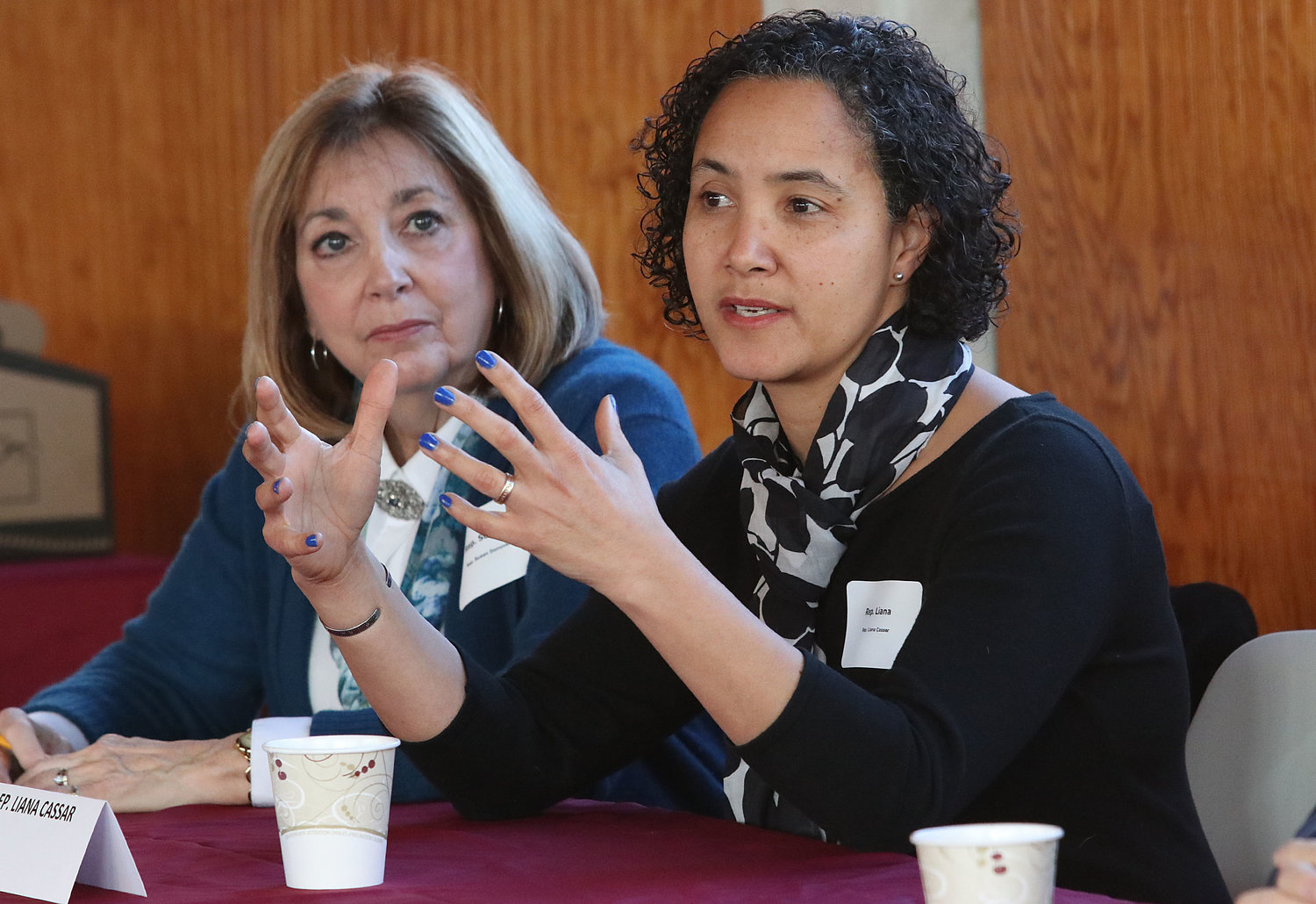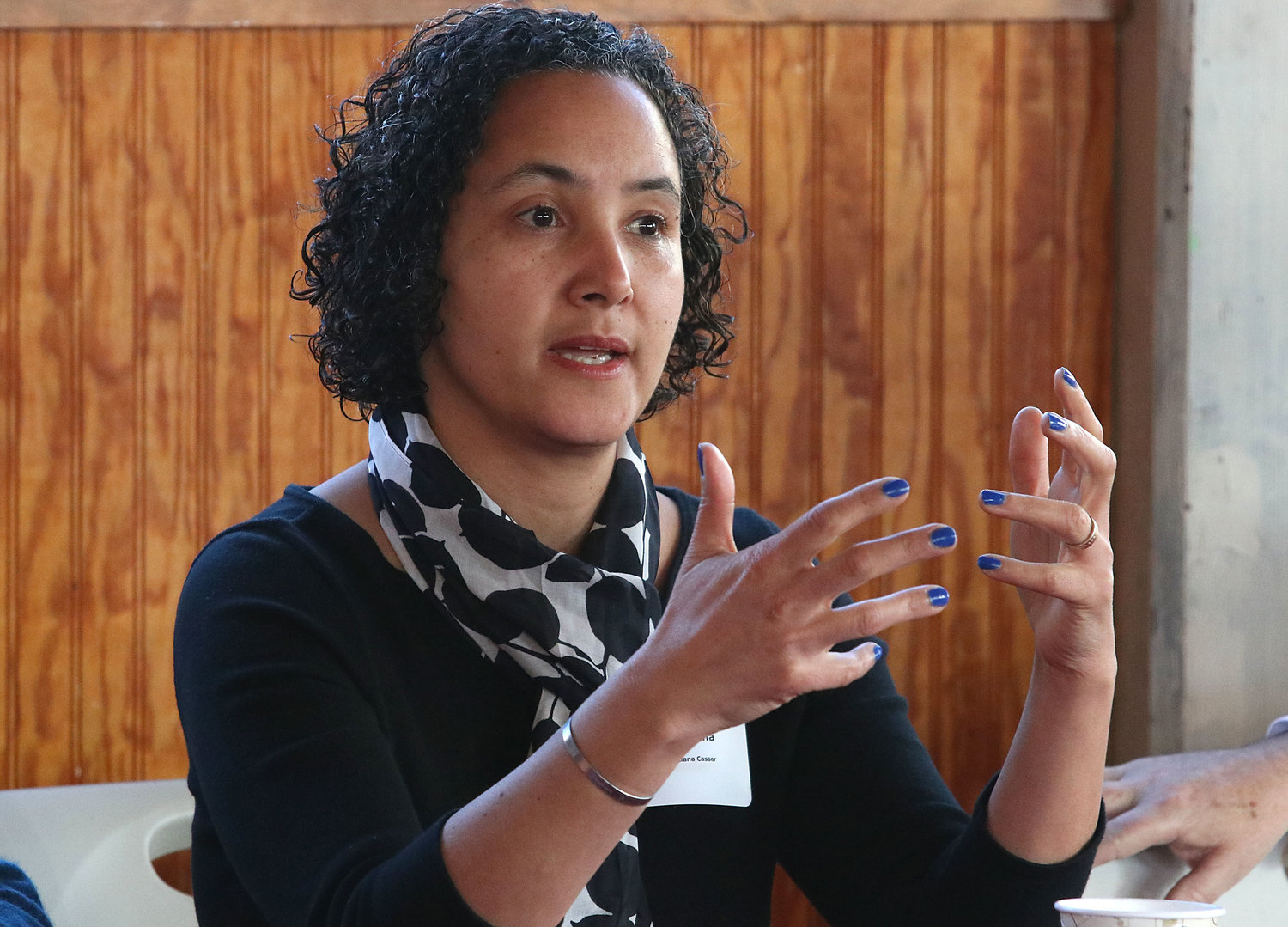- TUESDAY, APRIL 23, 2024
Mattiello a no-show, but legislators talk 'scoops' and schools, abortions and pot
The East Bay Chamber of Commerce hosted a breakfast gathering last Friday, Jan. 25, with legislators from Barrington, Warren and Bristol meeting with business leaders and private citizens. The event …
This item is available in full to subscribers.
Please log in to continue |
Register to post eventsIf you'd like to post an event to our calendar, you can create a free account by clicking here. Note that free accounts do not have access to our subscriber-only content. |
Day pass subscribers
Are you a day pass subscriber who needs to log in? Click here to continue.
Mattiello a no-show, but legislators talk 'scoops' and schools, abortions and pot
The East Bay Chamber of Commerce hosted a breakfast gathering last Friday, Jan. 25, with legislators from Barrington, Warren and Bristol meeting with business leaders and private citizens. The event headliner was supposed to be House Speaker Nicholas Mattiello, who was expected to appear with the local contingent. He did not.
State Rep. Kenny Marshall (I-Bristol and Warren) arrived to the forum a few minutes after it had started and announced that the Speaker would not be attending, before launching into a long rant about problems, as he sees them. After Rep. Marshall was done with his lengthy introduction, moderator Steve Primiano of Barrington guided the six legislators through a series of questions and answers for more than an hour.
Topics included recreational marijuana, the line item veto, the “Evergreen Bill,” public education, Rhode Island’s dubious budgeting practices, and abortion rights. Following are some of the highlights from what legislators had to say.
Introductions
After announcing that Speaker Mattiello would not be there, Rep. Marshal said, “I want to briefly sum up by apologizing if I sound angry today. Because you’re sitting in a property, right now, that had to do with fraud that was perpetrated on two communities in the last election.”
“Can you explain that?” chamber board member Andy Arruda asked.
Rep. Marshall continued: “This property was rented, at 16 Cutler St., and I want to go back even further, to when this property was first taken over by Av Tech. I was on the Mt. Hope Enterprise Zone with Alan Crisman, when this property was bought, and taken over by Av Tech, and it was grown into the worldwide entity it is now. But this property was rented and utilized by a Political Action Committee for the last election to help those that believe in their special interest agenda. It’s public information. It’s on their campaign finance reports …
“I’ll go further. It’s not easy to do what we do. We try to balance the very limited resources that we have, year to year. And as you know, those limited resources are on credit cards. The state’s in debt. It’s going to be $200 million. And there’s going to be more next year. You want to know why? Because the very budgets that we pass, year to year, gets overspent. That affects your businesses, my business.
“You know what I’m dealing with right now? I’m dealing with a utility company that has a monopoly on the state of Rhode Island, that can’t even provide natural gas to the state of Rhode Island. You know who asked the governor to call for a state of emergency? I did. You want to know why? Because I’m in it. I can tell you exactly what’s wrong, because I’ve been working with that natural gas supply line on the island for 30 years.
“You want to talk about the Reform Caucus? They want to tell you that everything is bad up there? They’re wrong. They want to talk about line item veto? They’re wrong. You want to know why? You want one person to decide what your property taxes should be? Or do you want your elected representatives to decide what your property taxes are going to be?
“Would you prefer they all have a choice, or would you prefer one person has a choice? That’s saying that all the mayors and town administrators, no disrespect to the town administrators here, have the power to choose what your property tax is going to be, regardless of what the town council says.”
Line item veto
Mr. Arruda asked why people would oppose the line item veto, when most of the voters in the state favor it. Speaking to Mr. Marshall, he said, “You question why we should put power in the hands of one person. Right now, it is in the hands of one person — Mattiello. Because he does not let everything come to vote. So every representative does not hold the power, because he holds all the cards.”
State Sen. James Seveney (D-Portsmouth and Bristol) said he favors the line item veto. “It’s a balancing act for the powers of government,” he said. “I don’t see a downside to it.”
Sen. Walter S. Felag Jr. answered this question by criticizing the state’s habit of taking “scoops” to balance the budget. These are one-time financial maneuvers, to take money from one nontypical source, or from restricted accounts, to pay for the general operating budget. An example was taking money from the Rhode Island Resource Recovery Corp. to balance the budget. Sen. Felag submitted legislation to prevent scoops, but it did not pass last year.
Rep. Liana Cassar (D-Barrington and Riverside) said, “I’m completely new to this political work, but when I was canvassing this summer, I felt like every third door, someone would ask me, ‘how do you feel about line item veto?’ And I spent some time doing homework on what other states are doing, and we are definitely in the minority. There are 38 states that have figured it out. There are a variety of ways to do it so that one person doesn’t make all the decisions … The line item veto is a Band Aid to making the budget more transparent, but it’s a good step.”
Rep. Marshall responded: “Dr. Conley has a book out called ‘Separate But Not Equal.’ There is an inherent, incestual relationship between the Senate and the governor and her administration. The Senate ratifies all the appointments to her administration. The Senate ratifies all judicial appointments. It’s a special relationship between the Senate and governor that the House doesn’t have. The House, the primary responsibility is to determine what your property tax is going to be. When you say that the populous wants to have line item veto, that was based on a poll of 400 people — 400 people that were polled.”
Mr. Arruda interrupted to say, “If you let it come to a vote, we’ll find out for real. But you won’t let it come to a vote.”
Mr. Marshall continued, “That’s right. You want to know something else? We let it come to a vote with Separation of Powers, because it was put forth by a special interest group, that the Providence Journal pushed, and you know what we got from Separation of Powers? We got 38 Studios. You know why? Because the governor has complete control over all appointments to boards and commissions now, with absolutely no legislative involvement. And also operates as the chairman and the executive director of the economic development corp.
“So when she, or he, wants something passed, like the EDC, and the legislature is funding it, for $100 million, for a guaranteed jobs program, they have no idea that the EDC now, just gave a guarantee of $75 million to one company. That was not the intent.
“So when they say they want line item veto and they talk about other states, they have to look at the makeup of government in those states. Some states have full-time legislators. We are part-time.
“Separate but not equal. We would have to come back into session, which is a very hard thing to do, to get people back into session, to override. And they say line item veto is to reduce your taxes and to expose fraud. Do you know what this legislative body has done, under Gov. Raimondo? This legislative body has reduced the budget, year after year, and reduced your business taxes, year after year.”
The ‘Evergreen Bill’
Barrington Town Manager Jim Cunha asked legislators where they stand on the “Evergreen Bill.” This proposal would force municipalities to continue to abide by the terms of an expired contract, in the event a contract expires without a new contract in place. “It’s a significant indication of where our state government is going, in terms of support for taxpayers,” Mr. Cunha said.
Because he has studied the issue at length, Rep. Jason Knight (D-Barrington and Warren) responded with a lengthy answer. He said the impetus for the bills was the actions of two cities — East Providence and Warwick — which took advantage of expired teachers’ contracts to make significant changes to employee benefits, healthcare costs and other terms of the contract. The cities reasoned that because they were no active contracts, they could make any changes they wanted to.
Rep. Knight said the Warwick case was challenged in court and upheld by a judge, who, in effect, “gave municipalities the green light to fundamentally change the way we had done business for five or six decades — which was, in good faith, the cities and town keep doing things the way we had been doing them under the old contract, until a new contract could be signed. And that’s how we do it in Barrington. And I believe that’s how we do it in Warren. Right? We don’t pull the rug out from under our employees by negotiating in bad faith.”
Rep. Knight said he heard from many people who were concerned about this bill, so he’s studied it and even bought a book on it. “It’s clear to me that the negotiation process is broken.”
Rep. Knight suggested that if the Evergreen Bill comes up again, there’s an opportunity to put a real timeline on the negotiation process, including mandatory arbitration, to prevent cities and towns from even facing that situation in the future.
Recreational marijuana
Sen. James Seveney of Bristol and Portsmouth said, “We’ve had over 750 deaths in the last two and a half years associated with opioids … We have a well-constructed but poorly funded substance abuse prevention system across the state, first. I think we’re sending the wrong message to our children, if on one hand, we’re trying to tell them to stay away, and on the other hand, we’re saying their parents can do it. I will vote no on it. I don’t think it’s worth the complications that come with it. I don’t think it will lead to the economic windfall that’s predicted."
Sen. Seveney talked about new data coming out of states like Colorado, where they have seen significant police resources devoted to petty crimes, and a corresponding increase in more serious crimes, because resources have been diverted. “It’s just not well thought out, and I don’t think the program has been around long enough in any state to truly understand it.”
Rep. Susan Donovan (D-Bristol and Portsmouth): “My big concern is that science has not caught up with the reality of intoxication, marijuana intoxication, with people driving and operating heavy machinery. Quite frankly, it scares me. It’s scary enough on the road, with the drunk driving problems we have … We’re dumping a huge problem onto our law enforcement community.”
Rep. Cassar: “From a public health point of view, we don’t know enough. But we have a significant substance abuse and mental health problem we need to tackle first. I think there’s room, down the line, for thinking about how to legalize recreational marijuana. I don’t think it should be as criminalized as it is, but I think seeing recreational marijuana as simply an economic opportunity, loses sight of the fact that there needs to be criminal justice reform, public safety … How do you manage an economy where people are going to fail drug tests fairly regularly, when that has been a standard in our hiring process in certain industries? I think there are many, many factors that need to be studied.”
She also talked about the “cultural norms” around marijuana, as we don’t have any sense of the standards, the rules, the times and places where recreational use should be acceptable. “I really think there are so many issues to figure out, and we leave ourselves vulnerable to a lot of potential problems.”
Sen. Felag: “I voted for medical marijuana about 10 years ago, and unfortunately, it took us about 10 years to get it right. So before we get into recreational marijuana, we have to be sure we have all our ducks in a row.”
Rep. Marshall: “Revenue is like a drug. Right? How can I get more revenue to pay for my special interest agenda? So let’s sell pot. Don’t you think it’s a series of steps? Shouldn’t we have our state police, and our cities and town, already working on this, because people are buying pot in Massachusetts, and soon to be Connecticut, because revenue is like a drug, shouldn’t we have our state police and police already learning about how to deal with people who are going to be coming across the border?”
Rep. Knight: “For the record, I’m a no.”
Public education
Rep. Knight: “I think RIDE [the R.I. Dept. of Education[ is a totally dysfunctional agency, and it needs to be overhauled. RIDE has had leadership that is effectively dead, for the last three or four years. I think [Commission] Ken Wagner has done a miserable job. I deal with RIDE in my practice, and I can see, from the bottom-level worker, to the mid-level worker, to the administrative office, all the way up the chain, there is no willingness to be accountable for results. It needs to change. We need a new commissioner. We need someone who is going to come in and crack the whip.”
Civics classes
Barbara Holmes, CPA from Barrington, asked about teaching civics in high schools, while criticizing the Speaker of the House for not allowing a bill to that effect to get out of committee to a wider vote. All the legislators said, ‘yes,’ they would support that bill.
911 and restricted accounts
Chamber board member Tim Pray asked about why every cell phone user in Rhode Island pays a monthly “911 fee” with their cell phone bill, but that money is not used to support the 911 system. Moderator Steve Primiano added to the question by asking why, when someone calls 911, the operator knows your general location, but if you call Uber, they know exactly where you are.
Sen. Seveney responded to the question by saying he is a big proponent of creating and protecting restricted accounts. “There’s a fine you pay, if you’re carrying more than an ounce of dope. It’s no longer a criminal offense, but it’s a misdemeanor, and you have to go to court and you pay a fine. That money, under the law, is supposed to go to substance abuse prevention programs. But it’s not in a restricted receipt account. So where does it go? No can say where it goes. No one up here. No one out there. It goes into the general fund.”
Rep. Marshall and Rep. Knight got into an argument on this issue, after Rep. Marshall put the blame for these financial maneuvers on the governor. “You can’t have it both ways,” Rep. Knight said to him. “Either the House of Representatives and the General Assembly control the budget, and the governor complies with the dictates of the budget, or she doesn’t. You’ve been on that House Finance Committee for years, when the 911 money has gotten scooped, and the Finance Committee has said, ‘ok, I’ll vote for it,’ at three minutes before midnight, year in and year out.”
Rep. Marshall shot back: “I’ve also been there, every December, when those revenues have been scooped by the administration, and transported to other departments in her administration, illegally, and we are dealing with a structural budget deficit that continues to grow, because she, or he, continues to overspend on line items, that we provide, and it gets added to, year after year, as opposed to following the law that we, as a House of Representatives, put forth in every budget, and the taxpayers rely on."
Abortion laws
Mike Byrnes of Bristol said, “New York just passed a very wide open abortion law, pretty much unlimited. I’d like to get a sense of whether you agree or disagree.”
Rep. Donovan: She disputed Mr. Byrnes’ assertion that the New York allows for “unlimited” abortions. “What we have right now is mandated by federal law, by Roe v. Wade. What I favor is keeping it the same as it stands now. Not expanding it, keeping it the same.”
Rep. Cassar: “The law in New York is intended to maintain the rights that women have now, with their reproductive choices, with the assistance of their health care providers. If we don’t pass that law, we move backwards in the area of women’s health. So I support what New York has done, and I support it here.”
Reps. Seveney and Knight and Sen. Felag agreed with passing a Rhode Island law to protect women’s abortion rights.
Rep. Marshall indicated he does not: “We have a law on the books. This takes the oxygen out of the room. This takes your energy, and our energies, off of the priorities of the state of Rhode Island.”
Other items that may interest you


